![[Previous]](../../../buttons/fprev.png)
![[Next]](../../../buttons/fnext.png)
DTC B1B1A: Curtain
Air Bag Module (LH) (Squib) System (Squib Circuit Open)

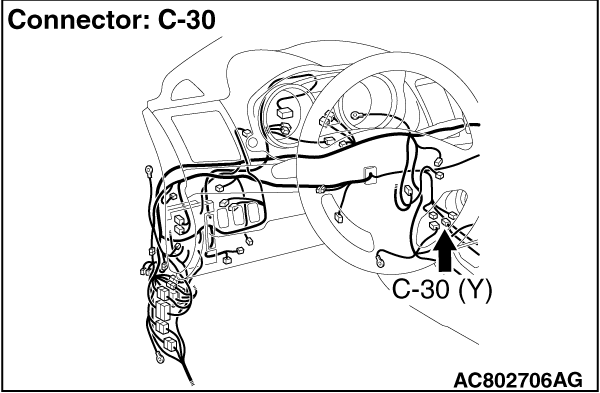
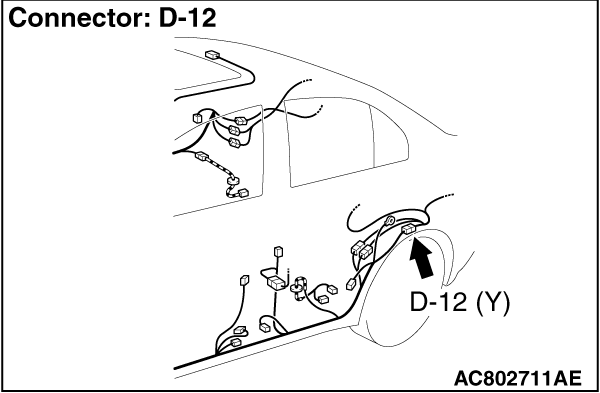
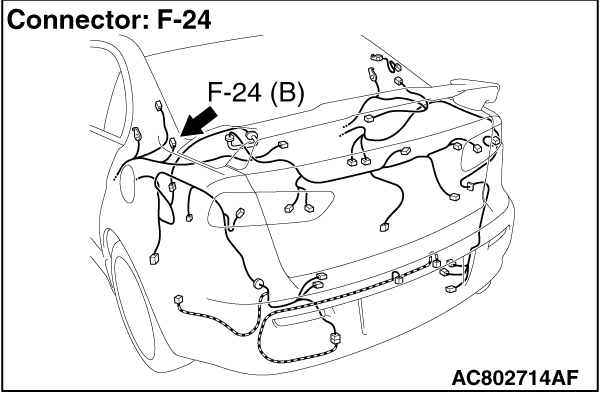
| caution |
If DTC B1B1A is set in the SRS-ECU, always diagnose the CAN
main bus line.
|
CIRCUIT OPERATION
- The SRS-ECU judges how severe a collision is by detecting
signals from the side impact sensors installed on the lower side of the center pillar. If the
impact is over a predetermined level, the SRS-ECU sends an ignition signal. At this time, if the
side collision safing G-sensor is on, the SRS air bag will inflate.
- The ignition signal is input to the curtain air bag module (LH) to inflate the curtain
air bag.
DTC SET CONDITIONS
This DTC is set if there is abnormal resistance between the input terminals of the curtain
air bag module (LH) (squib).
TROUBLESHOOTING HITS
- Open circuit in the curtain air bag module (LH) (squib) circuit
- Improper connector contact
- Malfunction of the SRS-ECU
|
|
Required Special Tools:
- MB991958: Scan Tool (M.U.T.-III Sub Assembly)
- MB991824: Vehicle Communication Interface (V.C.I.)
- MB991827: M.U.T.-III USB Cable
- MB991910: M.U.T.-III Main Harness A (Vehicles with CAN Communication System)
- MB991865: Dummy resistor
- MB991866: Resister harness
- MB991884: Resister harness
|
|
|
STEP 1. Using scan tool MB991958, diagnose the CAN bus line.
|
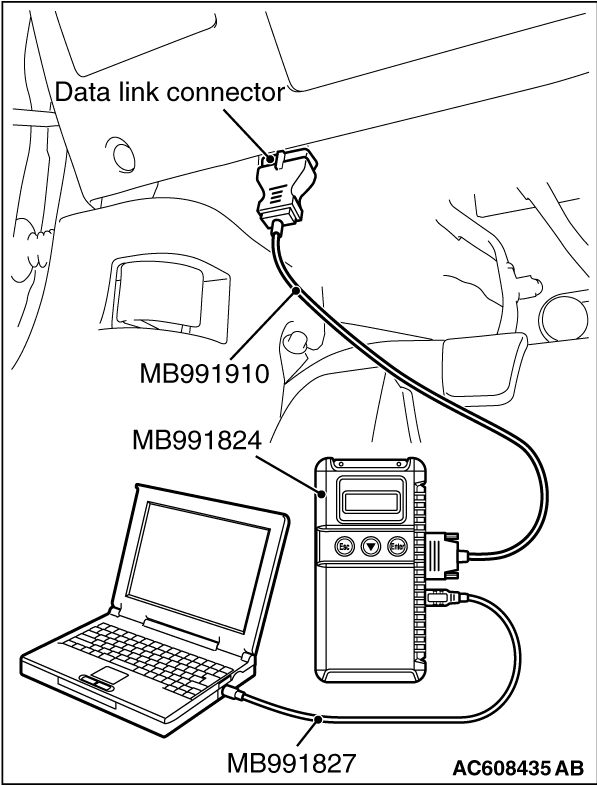
|
(1)
| caution |
To prevent damage to scan tool MB991958, always turn the ignition switch
to the "LOCK" (OFF) position before connecting or disconnecting scan tool MB991958.
|
Connect scan tool MB991958. Refer to "How to connect the scan tool  ." ."
(2)Turn the ignition switch to the "ON" position.
(3)Diagnose the CAN bus line.
(4)Turn the ignition switch to the "LOCK" (OFF) position.
Q.
Is the CAN bus line found to be normal?
 Go to Step 2. Go to Step 2.
 Repair the CAN bus line (Refer to GROUP 54C, Diagnosis Repair the CAN bus line (Refer to GROUP 54C, Diagnosis  ). ).
|
|
|
STEP 2. Recheck for diagnostic trouble code.
|
|
|
Check again if the DTC is set.
|
|
|
(2)Turn the ignition switch to "ON" position.
|
|
|
(3)Check if the DTC is set.
|
|
|
(4)Turn the ignition switch to the "LOCK" (OFF) position.
|
|
|
 Go to Step 3. Go to Step 3.
|
|
|
|
|
|
 There is an intermittent malfunction such as poor engaged connector(s) or open
circuit (Refer to GROUP 00, How to Use Troubleshooting/Inspection Service Points - How
to Cope with Intermittent Malfunctions There is an intermittent malfunction such as poor engaged connector(s) or open
circuit (Refer to GROUP 00, How to Use Troubleshooting/Inspection Service Points - How
to Cope with Intermittent Malfunctions  ). ).
|
|
|
|
|
|
STEP 3. Check by dummy resistor connection.
|
|
|
(1)Disconnect the negative battery terminal.
|
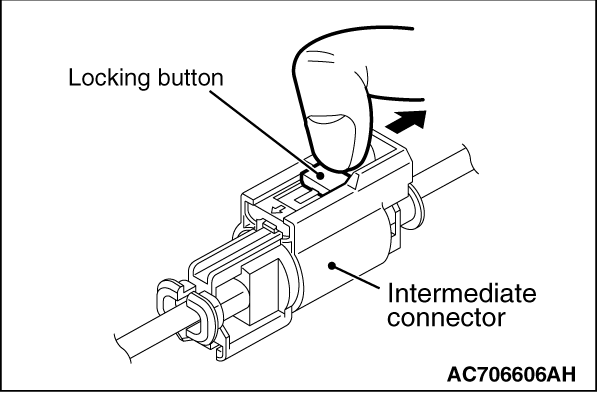
|
(2)Disconnect the D-12 intermediate connector unlock the connector by sliding the locking
button to the direction of the arrow as shown in the figure, and then disconnect the connector.
|
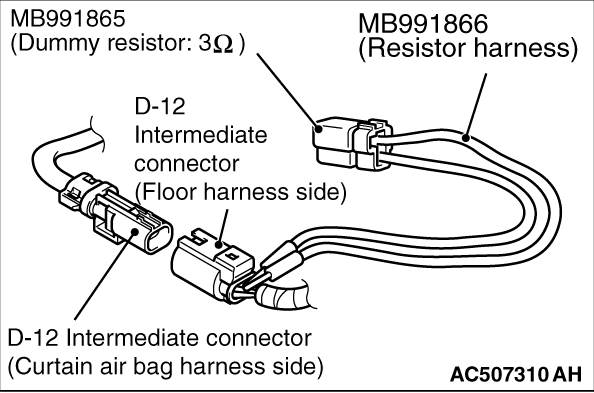
|
(3)Connect special tool MB991865 to special tool MB991866.
(4)
| caution |
Do not insert a probe into the terminal from its front side directly,
as the connector contact pressure may be weakened.
|
Insert the probe of resistor harness, to which the dummy resistor is installed, from the
back of D-12 intermediate connector (floor harness side).
(5)Connect the negative battery terminal.
(6)After erasing the diagnostic trouble code memory, check the diagnostic trouble
code again.
(7)Disconnect the negative battery terminal.
Q.
Is DTC B1B1A set?
 Go to Step 4. Go to Step 4.
 Go to Step 5. Go to Step 5.
|
|
|
STEP 4. Resistance measurement at the C-30 SRS-ECU connector and the
D-12 intermediate connector.
|
|
|
(1)Disconnect the negative battery terminal.
|
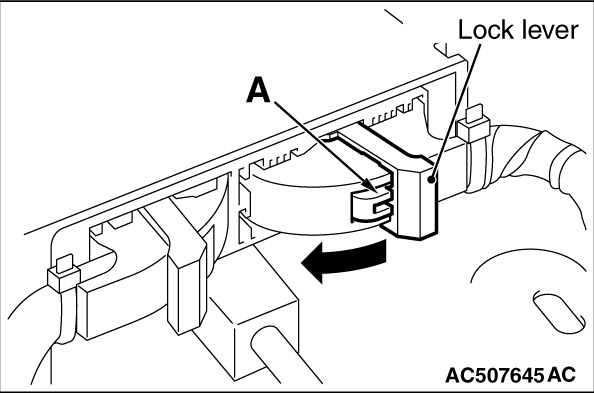
|
(2)While pushing the part "A" indicated in the figure of the harness side connector, turn
the lock lever to the direction of the arrow to release the lock lever, and disconnect the C-30
SRS-ECU connector.
|

|
(3)
| danger |
To release the SRS-ECU connector short spring in the following
operations, disconnect this intermediate connector, and keep the squib circuit shorted.
|
Disconnect the D-12 intermediate connector unlock the connector by sliding the locking
button to the direction of the arrow as shown in the figure, and then disconnect the connector.
|
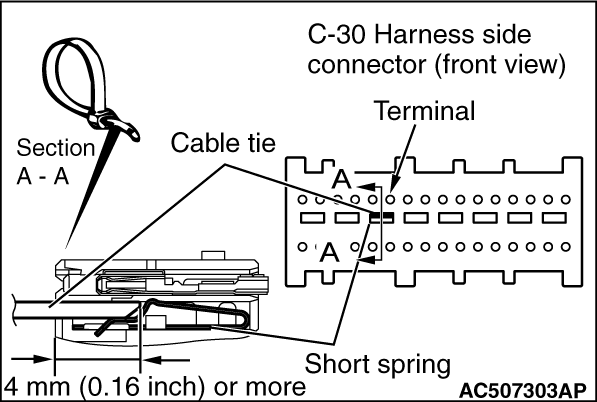
|
(4)
| caution |
The short spring may not be released due to the insufficient
insertion. Therefore, insert the insulator for 4 mm (0.6 inch) or more.
|
Insert a cable tie [3 mm (0.12 inch) wide, 0.5 mm (0.02 inch) thick] between
terminal 41, 42 and the short spring to release the short spring.
|
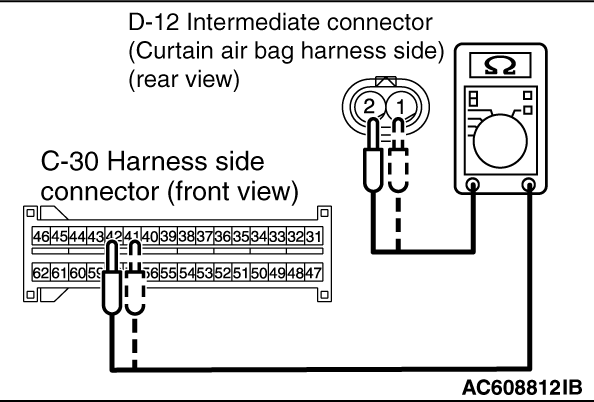
|
(5)
| caution |
Do not insert a probe into the terminal from D-12 intermediate connector front side directly,
as the connector contact pressure may be weakened.
|
Check for continuity between the following terminals. It should be less than 2 ohms.
- SRS-ECU connector C-30 (terminal No.41) and the intermediate connector D-12
(terminal No.1)
- SRS-ECU connector C-30 (terminal No.42) and the intermediate connector D-12 (terminal
No.2)
Q.
Does continuity exist?
 Go to Step 6. Go to Step 6.
 Repair the wiring harness between the C-30 harness side connector terminal No.
41, 42 and the D-12 intermediate connector (floor harness side) terminal No. 1, 2. Repair the wiring harness between the C-30 harness side connector terminal No.
41, 42 and the D-12 intermediate connector (floor harness side) terminal No. 1, 2.
|
|
|
STEP 5. Resistance measurement at the D-12 intermediate connector
terminal No. 1, 2 and the F-24 curtain air bag module harness side connector terminal No. 1,
2.
|
|
|
(1)Disconnect the negative battery terminal.
|
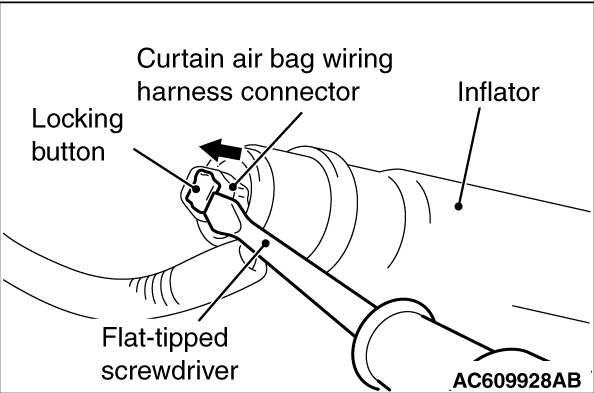
|
(2)Disconnect curtain air bag module (LH) F-24. Use a flat-tipped screwdriver to unlock the
locking button at the harness side connector by withdrawing it toward you in two stages, and
then disconnect the connector.
|

|
(3)Disconnect the D-12 intermediate connector unlock the connector by sliding the locking
button to the direction of the arrow as shown in the figure, and then disconnect the connector.
|
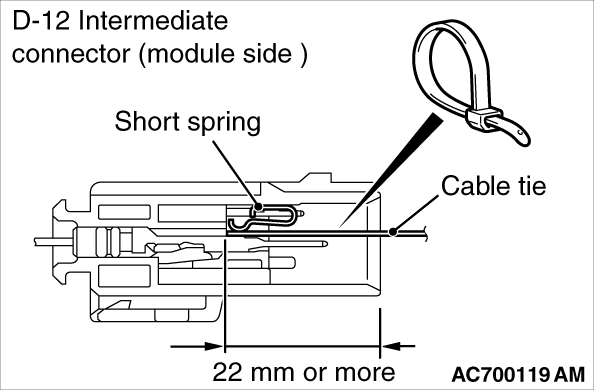
|
(4)Because the short spring is installed to the D-12 intermediate connector (curtain air
bag harness side), insert a cable tie [3 mm (0.12 inch) wide, 0.5 mm (0.02 inch) thick] between
terminals 1, 2 and the short spring to release the short spring.
|
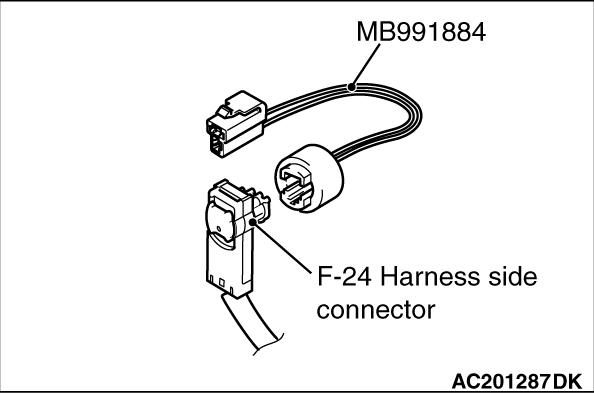
|
(5)Connect special tool MB991884 to the removed F-24 harness side connector.
|
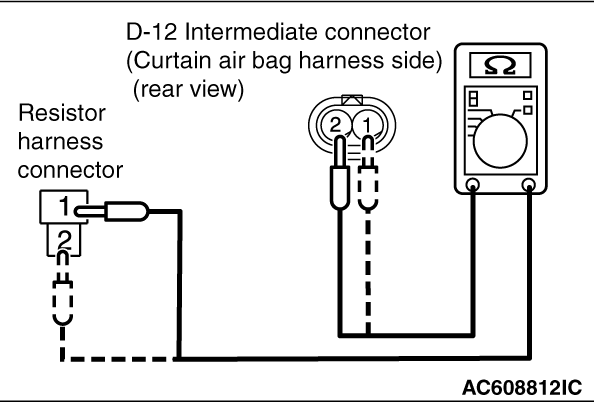
|
(6)
| caution |
Do not insert a probe into the terminal from D-12 intermediate connector front side directly,
as the connector contact pressure may be weakened.
|
Check for continuity between the following terminals. It should be less than 2 ohms.
- Intermediate connector D-12 (terminal No.1) and resistor harness connector
terminal No.2)
- Intermediate connector D-12 (terminal No.2) and resistor harness connector terminal
No.1)
Q.
Does continuity exist?
 Replace the curtain air bag module (LH) (Refer to Replace the curtain air bag module (LH) (Refer to  ). ).
 Repair the wiring harness. Repair the wiring harness.
|
|
|
STEP 6. Recheck for diagnostic trouble code.
|
|
|
Check again if the DTC is set.
|
|
|
(2)Turn the ignition switch to the "ON" position.
|
|
|
(3)Check if the DTC is set.
|
|
|
(4)Turn the ignition switch to the "LOCK" (OFF) position.
|
|
|
 Replace SRS-ECU (Refer to Replace SRS-ECU (Refer to  ). ).
|
|
|
|
|
|
 Intermittent Malfunction (Refer to GROUP 00, How to Use Troubleshooting/Inspection
Service Points - How to Cope with Intermittent Malfunction Intermittent Malfunction (Refer to GROUP 00, How to Use Troubleshooting/Inspection
Service Points - How to Cope with Intermittent Malfunction  ). ).
|
|
|
|

 ."
." Go to Step 2.
Go to Step 2. Repair the CAN bus line (Refer to GROUP 54C, Diagnosis
Repair the CAN bus line (Refer to GROUP 54C, Diagnosis  ).
).![[Previous]](../../../buttons/fprev.png)
![[Next]](../../../buttons/fnext.png)












